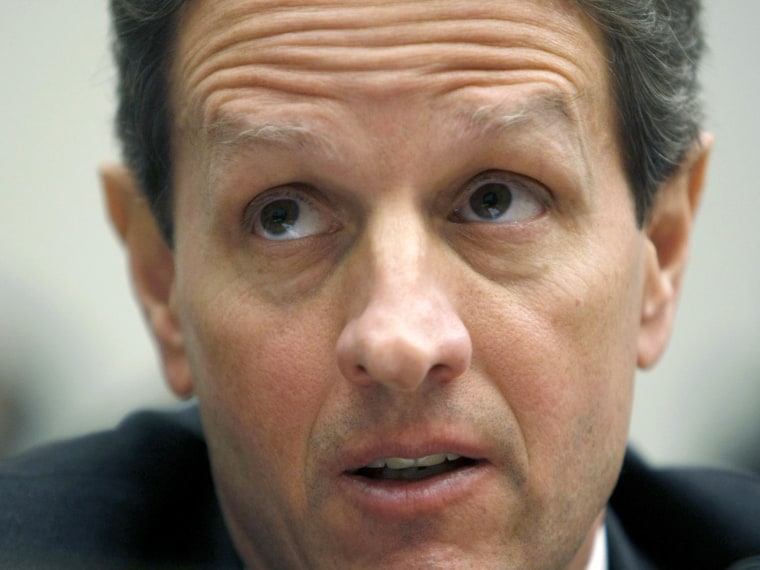The U.S. Treasury, Federal Reserve and White House have all come together in opposition to the notorious "platinum coin" plan, msnbc contributor Ezra Klein over at Washington Post's Wonkblog reported Saturday, laying to rest speculation that the Treasury was mulling the idea of minting a trillion dollar platinum coin to circumvent the Congressionally-imposed debt ceiling.
"Neither the Treasury Department nor the Federal Reserve believes that the law can or should be used to facilitate the production of platinum coins for the purpose of avoiding an increase in the debt limit," Treasury spokesman Anthony Coley said in a statement Saturday.
Thank goodness and good riddance.
With the first half of the fiscal cliff behind us, the White House needs leverage in negotiating with House Republicans—despite its insistence that it refuses to negotiate—and “Mint the Coin” was an interesting, Austin Powers-esque proposal that many folks thought could be that leverage. It was an interesting and quirky idea that would have been toxic to Democratic candidates everywhere.
There are few things more potentially dangerous to a party working to preserve entitlement spending than simply conjuring money out of thin air. The GOP attack ads write themselves. They could have been devastating in 2014's midterm elections, which will be critical to Democrats as they try to protect the massive gains they made in the U.S. Senate back in 2008.
I fully understand why nerdy and wonky swaths of the commentariat were seduced by this idea: it's technical and clever. Frankly, we need more ideas of that nature in our national dialogue. But explaining just how the coin would have worked was always a dangerous proposition. The idea begets hesitance and scrutiny: not exactly a solid foundation on which to potentially stake a defining element of your party’s fiscal and monetary policy. Sure, we can get in to conversations about the magic of money as msnbc's Chris Hayes did on his program expertly this morning, but you can’t put that in to an effective 30-second ad.
It's unfortunate that President Obama has also taken the 14th Amendment off the table. Former President Bill Clinton was right in his advice to cite the 14th Amendment in the event Congressional Republicans fail to raise the debt ceiling. Congress is accountable for the spending it approved, and lawmakers shouldn't act to the contrary. Unfortunately, by further cementing the demise of the constitutional option, (they’ve ruled it out in the past) the Obama administration has put itself in a poor position from which to negotiate with GOP leadership.
I'm sincerely hoping that nobody is counting on this to be a show of good faith in an attempt to woo House Republicans. It isn’t. It’s another reminder that President Obama is, at heart, an ardent institutionalist (Why else would a former community organizer want to be president?) and a believer in the system.
And that might be a problem. GOP leadership has shown zero hesitancy in bucking systemic convention (e.g. filibustering Administration nominees and taking us to the brink of default) to obstruct the president’s ability to effectively govern. Removing both the platinum coin and the constitutional option—without the debt ceiling included in the fiscal cliff bargain—means that the White House isn’t holding many cards. Interestingly, all that’s left is the president’s pledge not to negotiate. Which is an odd card to hold in any negotiation. Anybody who supports sane fiscal policy, at this point, is left simply to hope that he doesn’t blink.
President Clinton took us to the brink of default and walked away with a major win over House Speaker Newt Gingrich by taking his case to the American people. President Obama should do the same.
If nothing else, this entire episode is a lesson in the fact that policy and perception are nearly impossible to separate. Minting the coin may have been sound monetary policy, but positive perception was absent from the get-go. Sometimes good policy passes despite poor perception (e.g. Obamacare) and sometimes terrible policy passes because of undeservedly positive perception. (e.g. The debt ceiling.)
It's also a great lesson in how a campaign that gets its start on Twitter (h/t to @TheStalwart and @JBarro) can force a response from three of the world's most powerful institutions: the Federal Reserve, Treasury and White House.
As President Obama himself might say: Not bad!
